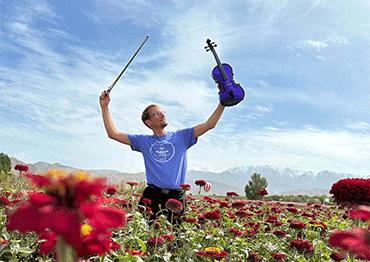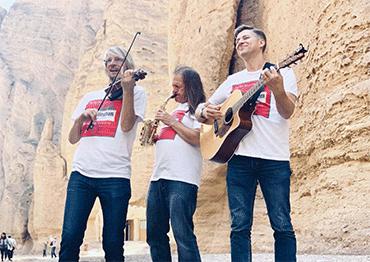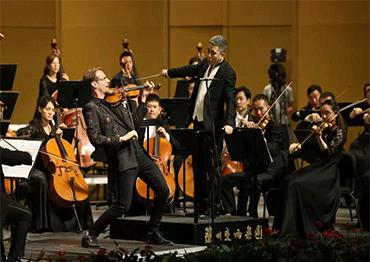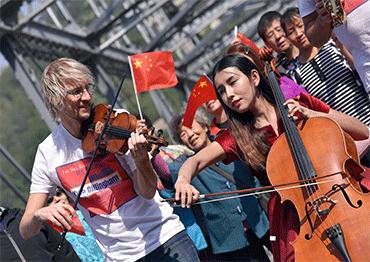merican fiddler Kyle Dillingham has impressed audiences in 40 countries, including China, through his creative blend of American musical styles with local elements from his host countries.
Representing his home state of Oklahoma and the US in cultural diplomacy programs for the US State Department, Dillingham coined his sound as “Heartland Americana,” a combo of blues, bluegrass, gypsy jazz, Western swing, country, rock and gospel.
Since his first performance in Beijing in 1999, Dillingham has toured numerous Chinese cities during his 15 visits to the country.
In September, he made his seventh visit to Northwest China’s Gansu Province for the 7th Silk Road (Dunhuang) Cultural Expo. Gansu, which he considers his “Chinese home,” is where Dillingham collaborated with Mongolian and Tibetan artists and served as an artist-in-residence at Northwest Minzu University in Lanzhou, the provincial capital.
Officially sister states, Oklahoma and Gansu are rich in cultural heritage. Oklahoma is known for its Native American and cowboy cultures, while Gansu’s Hexi Corridor, with Dunhuang at its western edge, has long been a meeting point of Eastern and Western civilizations where multi-ethnic communities have lived together for thousands of years.
During the Expo, Dillingham and his group, Horseshoe Band, performed “Old Friends,” a song he wrote that blends American and Chinese folk elements. “Sing with me, drink with me, share with me. I’ll soon be gone but I’m coming back again,” they sang.
“It is so fun to hear the song fluidly shift from the folk sounds of one country to the next,” Dillingham told China News Service in an email interview, where he shared his experiences in China and thoughts on promoting cultural exchange through music.
China News Service: When and why did you decide to travel the world to perform?
Kyle Dillingham: I started traveling around the world while still in high school. The violin became like a passport for me. Sharing music is such an excellent way to foster global relationships between cities, states and countries, and I have been so proud of this work I’ve been able to do. I have now represented my home state of Oklahoma and the US in over 40 countries over the last 27 years. I believe it is important work and helps the people on both sides to connect in a non-political way – to connect on the things that we share, like the love of music.
CNS: Tell us about your first visit to China.
KD: I remember my first trip very fondly. It was in June 1999. I gave a performance at the Central Conservatory in Beijing and my performance was broadcast on Chinese national TV [China Central Television]. A young violinist was interviewed after the performance, and she was crying. She was asked, “Why are you crying?” She responded, “I arrived late and missed half of the performance.” She went on to say that she heard me performing traditional music from America, traditional music from China and music that she was studying at the conservatory. With all of the music, I was having fun. Nobody ever told her she could have fun with her music. It was all serious work. This was a very touching moment for me, and I think it changed this young girl’s life.
CNS: You have been to many Chinese cities, which regard you as their “old friend.” Do you like being called that?
KD: I love the title “old friends.” We continue to work this title into our tours. I have a friend who tells me, “The only thing that makes a 20-year friend is 20 years.” It’s actually a big deal to me that I am celebrating 25 years this year since my first time in China. The only thing that makes this 25-year friendship I have with China is 25 years. I’m proud of that. It’s important to keep this friendship alive. I have been to Beijing and Tianjin, and Taipei, Taichung, Tainan and Kaohsiung [in Taiwan], Xi’an and Baoji [Shaanxi Province], [Gansu Province’s] Lanzhou, Qingyang, Dunhuang, Tianshui, Zhangye, Jaiyuguan City, Linxia, Gannan and Baiyin, and Shanghai.
CNS: Why do you include so much classical Chinese music in your performances in China?
KD: I always try to perform the music of the country I am visiting. I think it helps to make a connection with the audience and draw them into the show. It also lets the audience know that I care enough about them and their culture that I would take the time to learn some of their music. It is also very exciting for me and my band to learn new music. There is a different feeling we get when we play Chinese music.
CNS: Do you and your band find it challenging to arrange Chinese music?
KD: Not all music is created equal. Some of the songs come naturally, while others, like the very famous erhu [Chinese two-stringed violin] music that we reinterpret for the violin “Horse Race,” takes much more time and commitment to perform well. But I think it is very rewarding for us and for the audience. I have a brand-new band with me this time. It will be our first tour ever. So, there will be many technical changes from my last China tour. [Dillingham and his band Horseshoe Road performed “Horse Race” with students on the erhu at the Lanzhou Petrochemical University of Vocational Technology on September 22].
CNS: There is a very famous mural in Dunhuang’s Mogao Grottoes called Playing the Pipa Backwards. The pipa, a plucked string instrument introduced to China from Persia through the Silk Road, symbolizes early cultural exchange. Now, you and the band have brought violins to Dunhuang for a performance. What more can we can do to further promote musical exchanges?
KD: I have seen this famous mural when I visited the Mogao Grottoes. It is indeed a marvelous symbol and embodiment of Eastern and Western music. And yes, I do believe that my performance in Dunhuang on the violin is also an embodiment of Eastern and Western music. Some may even ask how an American country music band even belongs at the Silk Road International Expo in Dunhuang. Well, I want to introduce you to the word “fiddle.” This is the word we use for violin when the instrument is being used to play American country music. I like to talk about an idea called “The Silk Road and the Fiddle.” I like to say that without the Silk Road, you would not have the birth of the modern violin in Europe. This violin would never make its way to America and there would be no such thing as American “fiddle culture.” And you would not have a young Kyle Dillingham being born in Oklahoma in 1978 learning to love the fiddle and eventually taking my love for this instrument and style of playing all the way back to China and The Silk Road. And it is in China where I am learning that there are not so many differences between the traditional “country music” of China and the traditional country music of America. So, besides the integration and collaboration of musical instruments, I think the next step is for us to really soak up the sounds and feelings of the traditional music from each country to really begin to understand each other better and see just how similar we really are.
CNS: What were your impressions of the Dunhuang Cultural Expo?
KD: I am so proud to say that this is going to be my fourth time to participate in the Dunhuang Cultural Expo. I was actually in Dunhuang for the very first Expo in 2016, so I feel a very special connection to this place and event. When I saw this expo for the first time, I said, “Only in China!” What a magical place Dunhuang is, and the expo celebrates and accentuates everything incredible about this place and its history. And when I brought my band for the first time the following year in 2017, we gave the first ever performance by any American country music group. In a place that has thousands of years of history and exchange of culture from the East and West, this really feels like a truly historic moment. As a member of the Country Music Association, I can say that I am actually bringing country music to new frontiers. And what is even greater is the way that my experiences in Dunhuang have influenced me and perhaps allowed me to return home to Oklahoma and bring a taste of Dunhuang culture to a new frontier in America as well.
CNS: Will you continue to tour China and other countries?
KD: I hope that I will always have opportunities to share my music in China. This will be my seventh visit in the last nine years. I was unable to visit from 2020-2023. But when I saw the press release that travel to China for Americans was again possible, I did not hesitate for even a moment to start planning my return, and in May 2023, I gave a big concert with the Lanzhou Symphony Orchestra where I gave the Chinese premiere of the orchestral arrangement of my song, “Old Friends.” I wanted to create a strong statement about my dedication and commitment to my long friendships in China. I also plan to continue touring other countries as well. In fact, I am set to give a big performance in Thailand this November.
CNS: How can music be used to foster global exchanges and cooperation?
KD: When you translate, you do not have one word that equals another word in the next language. No! You have a completely different set of tools for expressing ideas. Each word has its own sound which means something very specific to people who understand each language. Just the same way, music is a set of sounds that have very deep and specific meaning. But what elevates music above other languages is that it is truly universal. Music communicates directly to the heart and with the soul, so music must be the very best and most effective way for us to communicate with one another globally – whether it is personal or professional, in business or cultural exchange. We can accomplish so much by sharing music with one another because you can get right to the heart of every matter without any of the things that divide us.
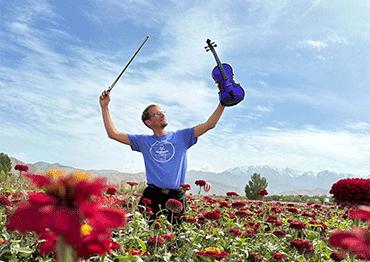
 Old Version
Old Version
